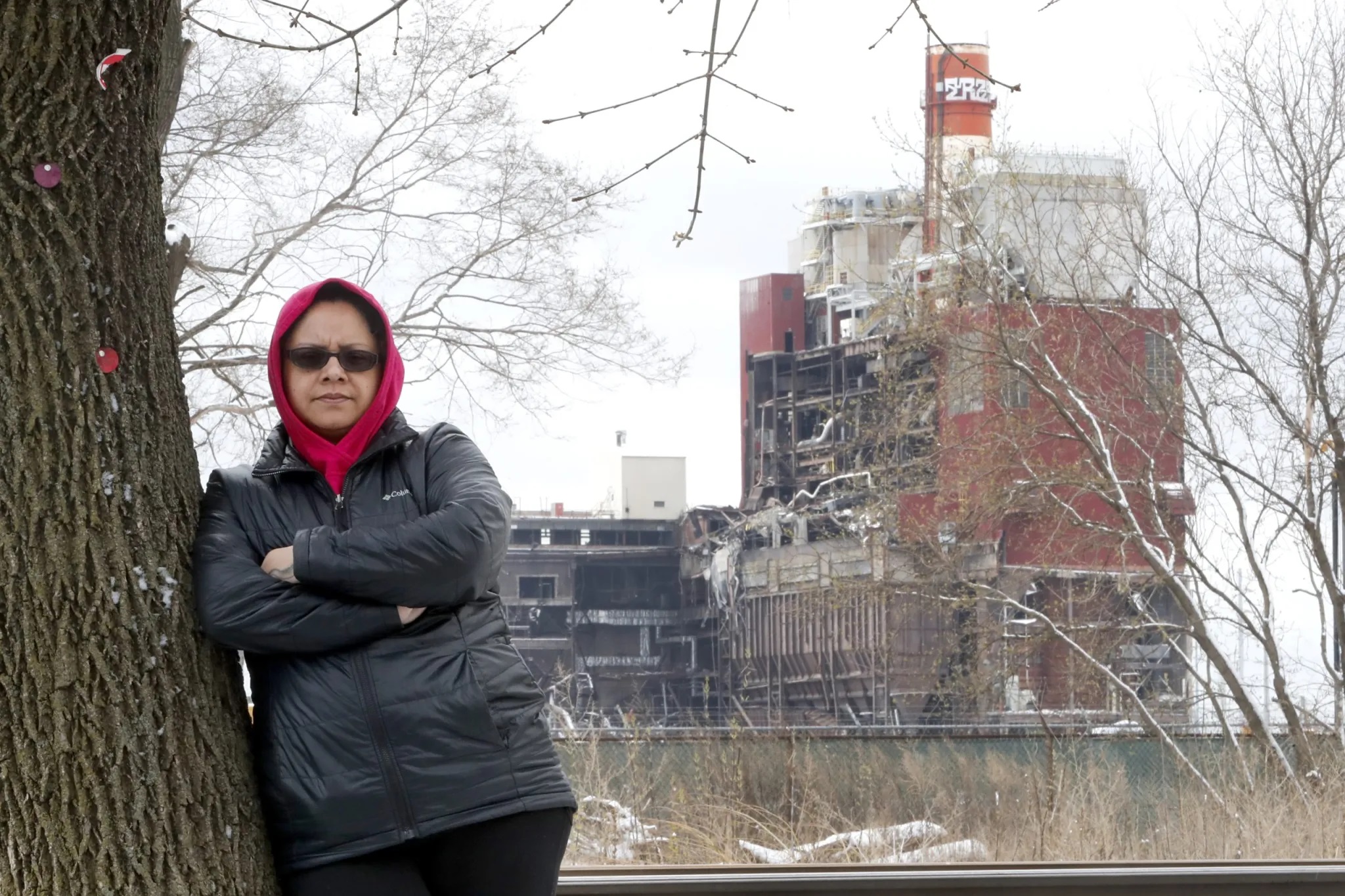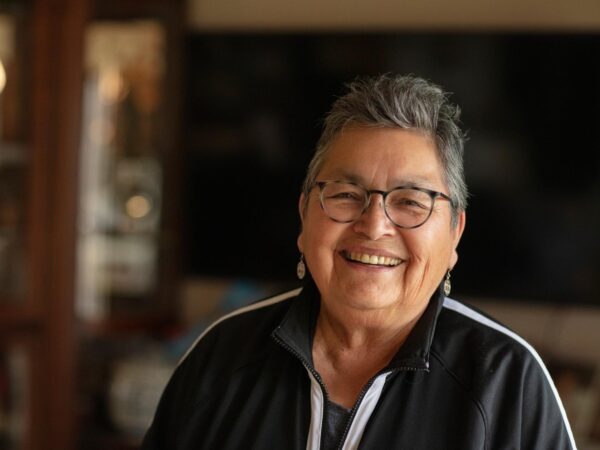
By Kari Lydersen, Energy News Network
This story was first published on the Energy News Network and was republished here with permission.
Illinois activists who led fights to close coal plants and ban petroleum coke storage are now leading the charge for a bill that would provide new powers and funding to environmental justice communities.
The legislation (HB4093/ SB2906) would create a more robust community participation and oversight process for new industry in environmental justice areas. It would also expand the definition of environmental justice communities and direct funds from violations directly to those communities, among other provisions.
“Enough is enough. Communities must have a way to be involved in a permitting process that is really broken,” said Gina Ramirez, a representative of the Natural Resources Defense Council and activist on Chicago’s Southeast Side, where residents after a years-long fight achieved a ban on the storage of petcoke in Chicago.
The bill, which passed in the state House in March and is now in the state Senate, is sponsored by state Sen. Celina Villanueva. Villanueva’s 11th district includes Little Village, where a coal plant that ultimately closed in 2012 became an international symbol of the environmental justice impacts of coal.
“Ensuring equity among Illinois residents requires confrontation of the disparities and environmental impacts on low-income areas, in communities of color, and in neighborhoods that lack economic and health care opportunities,” said Villanueva, who also lives in Little Village, during a March 30 press conference.
The bill would mandate new responsibilities for the Illinois Environmental Protection Agency and companies when a new industry proposes to open or an existing industry seeks permission to increase emissions in an environmental justice community.
The bill would force the Illinois EPA to consider the cumulative impact of air pollution when deciding whether to issue new facility permits. It would require an examination of the compliance history of companies seeking permits. It would require more community participation, including a public meeting before permits are issued, and ensure that translation services are available. A study would need to be conducted by an independent third party exploring the environmental and health impacts of the proposal. The bill would also give residents the power to challenge permits that have been issued.
“This bill puts power into the people’s hands,” Villanueva said.
The bill would charge an extra $200,000 fee on polluting facilities seeking permits in environmental justice communities, and it would charge the Illinois EPA with tracking funds paid for violations in such communities, directing the money toward beneficial environmental projects in those areas. The bill would also let communities petition to be designated environmental justice communities.
At the press conference, advocates said they have been in discussions with the Illinois EPA, and that the agency has indicated support for the bill.
Grassroots organizations galvanized by struggles against pollution from coal plants and pet coke have gone on to lead campaigns against other environmental justice issues. One example is the relocation of a metal shredder from a wealthy neighborhood in Chicago to the far Southeast Side, not far from the petcoke storage site. As Ramirez noted, the city eventually revoked permission for the shredder relocation after four years of protests and negotiations. Southeast Side activists also forced the investigation and cleanup of a local company emitting high levels of toxic manganese.
There may be relatively few energy-related polluting projects proposed for Illinois communities going forward. The state’s Climate and Equitable Jobs Act passed last year mandates all fossil fuel generation cease by 2045, and most coal plants are expected to close much sooner. But the environmental justice bill would help communities that have long suffered from the coal, oil and gas industries protect themselves from further pollution.
Air quality on Chicago’s near Southwest Side improved after the closure a decade ago of two coal plants in Little Village and the adjacent Pilsen neighborhood. But in 2018 an asphalt plant opened in the nearby McKinley Park neighborhood with little notice to residents. The process has since sparked an investigation and the plant has been the subject of complaints and environmental fines.
“There was no public notice of this coming into our community — none, zero,” said McKinley Park resident Alfredo Romo, director of Neighbors for Environmental Justice, speaking in Spanish and English during the press conference. “If hearing from us was important to the Illinois EPA they would have done public outreach. … If hearing from Spanish-speaking residents and addressing the concerns of the Asian community was important to the IEPA, the air pollution complaint forms wouldn’t only be in English.”
“Right now the Illinois Environmental Protection Agency thinks issuing the permit is their job and getting community input is optional,” Romo continued. “Protecting the environment is their job; protecting environmental justice communities is their job. … Issuing permits to polluters is optional. … We need this bill to make sure no more surprise industrial facilities are built in environmental justice communities.”
Kim Wasserman, executive director of the Little Village Environmental Justice Organization, added that “people in our communities have been demanding more transparency and community participation in the state of Illinois permitting process.”
“Because we continue to be on the receiving end of environmental disasters and questionable citing, we are fighting to make sure this creates the first definition of environmental justice in the Illinois Environmental Protection Act,” said Wasserman, recipient of the international Goldman Prize for her organization’s work including around the local coal plants.
Leah Hartung, a steering committee member of Clean Power Lake County, noted residents are demanding “just transition” job training and economic supports as the NRG coal plant in Waukegan north of Chicago will close this year. Hartung framed the environmental justice bill as integral to the significant just transition components of the Climate and Equitable Jobs Act.
“A truly just transition reimagines what our community can look like, and builds on the legacy that the Climate and Equitable Jobs Act chartered,” Hartung said. “Coal is on the way out. … Without enacting the environmental justice act, our state won’t be ready for when these facilities close and we will miss opportunities for transformative change. … As a result, history will repeat itself and Black and Brown and working-class communities will continue to be sacrifice zones and dumping grounds for the worst pollution industry has to offer. That’s not a future we’re willing to accept.”
Catch more news on Great Lakes Now:
Chicago educator empowers students to make climate connections in their own communities
Canada’s Maude Barlow chronicles 40 years of activism in new book, “Still Hopeful”
Featured image: Kim Wasserman with the Little Village Environmental Justice Organization in April 2020 near the Crawford Coal Plant, the last of the city’s coal power plants, where demolition was ongoing. (Photo Credit: Charles Rex Arbogast/AP Photo via Energy News Network)




